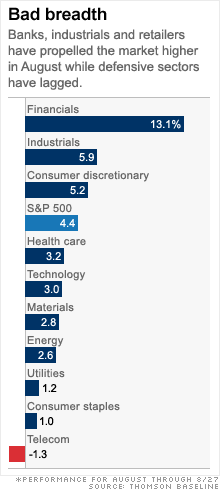Stop the market insanity
Highly speculative financial and consumer stocks have led a sleepy summer rally. Will investors start acting more rationally after Labor Day?


NEW YORK (CNNMoney.com) -- The market keeps chugging along. But with speculative stocks like AIG and Vonage leading the way, you have to wonder if the rally won't soon go off the rails like Ozzy Osbourne's Crazy Train. Ay-Ay-Ay!
AIG (AIG, Fortune 500) is up more than 260% this month for no apparent good reason. Shares of Internet phone company Vonage (VG) had quadrupled this week before pulling back Friday. Apparently, Google's renewed interest in online voice chatting was viewed as a potential boost for Vonage -- even though the opposite is probably true since Google (GOOG, Fortune 500) tends to squash competition like grapes.
Some investing pros worry that day traders have taken control of the market thanks to light volume in the waning days of summer.
"When you see the single-digit stocks hit the most-active list, it's a sign that speculation is at its peak," said Jeffrey Saut, chief investment strategist for Raymond James & Associates in St. Petersburg, Fla.
But once big institutional investors return, many of the hot momentum stocks could plummet. Some fear that could bring the whole market down.
That doomsday scenario may not necessarily happen. While a quartet of government propped-up financials -- Citigroup (C, Fortune 500), Bank of America (BAC, Fortune 500), Fannie Mae (FNM, Fortune 500) and Freddie Mac (FRE, Fortune 500) -- have dominated the market action as of late, there are pockets of the stock market that have not participated in the recent surge.
In fact, 97 of the stocks in the S&P 500 were down so far this month through Thursday, including leading companies in healthcare, energy, telecom and consumer staples. Another 54 companies have been relatively flat (up less than 1.5% in August.)
With that in mind, it's possible that some of the frothier financials could take a hit once volume picks up after Labor Day. But a sell-off in banks doesn't have to lead to a broad pullback. Instead, you could have what's known as sector rotation.
Investors may dump some of the financials and retailers that have enjoyed scintillating returns in August and put money back into drug stocks, oil companies and brand-name food and beverage makers. As long as that happens, the damage to the overall market could be limited.
"Health care, energy and consumer staples are all fairly large weightings in the S&P 500 and across the board, those sectors have underperformed," said Mike O'Rourke, chief market strategist with BTIG, an institutional brokerage firm in New York.
"There are two ways you can have a correction. Stocks actually go down or they move sideways over time," O'Rourke added. "I think the market is going to go sideways. Investors may sell speculative companies and rotate into more defensive blue chips."
John Kosar, director of research with Asbury Research in Chicago, isn't buying this argument though.
He said that if investors start to look more at health care companies and stodgy consumer giants like Coca-Cola (KO, Fortune 500) and Procter & Gamble (PG, Fortune 500), it's probably a sign that they are losing confidence in the possibility of a robust economic recovery.
"If people start pouring into health care and other defensive sectors, they are doing it for a reason. They are looking for a place to hide," he said.
Kosar said many big institutional investors have been buying stocks because they have to chase momentum. In other words, they are fearful of what their returns will look like if they sit the rally out and may not be convinced that a sustained rebound is in the cards. So if there is a sell-off, it could be painful.
"A lot of money managers have been buying stocks not because they are in love with the market and think that things are hunky-dory and we're going back to the 1990s," Kosar said. "All that means is when the inevitable sell-off comes, you will get a lot of people looking for the door at the same time."
Brad Sorensen, director of market and sector research with Charles Schwab, isn't predicting a massive rush for the exits. He does think the financial sector is overdue for a drop and that it's likely to happen once trading volume perks up.
But unlike O'Rourke, he thinks investors may flock to cyclical sectors, companies that usually do well in the nascent stages of a recovery.
"The speculative financials are a bit overdone at this point in time and once the adults are back in the room, a pullback could happen relatively quickly," Sorensen said. "But other leaders of the rally since March will reassert themselves -- materials, industrials and tech."
Matt O'Reilly, chief investment strategist at People's United Bank in Bridgeport, Ct., also said that tech and materials companies should be leaders going forward as more companies look to rebuild depleted inventories. He said the increased sales guidance from Intel (INTC, Fortune 500) Friday is another sign that the global recovery could be for real since it's evidence of improving demand.
Regardless of what happens with various sectors in the next few months though, most strategists said that the best thing that could happen for the market would be if investors simply started buying more high-quality companies again -- no matter what industry they happen to be in.
"It's clear that the market, in order to grind higher, needs more empirical evidence from companies about a recovery," said Quincy Krosby, market strategist with Prudential Financial. "The market has been propelled higher by lower-grade companies. What needs to happen is a move into the best of breed companies, the ones with better balance sheets."
Talkback: Does it make more sense to invest for a potential recovery or prepare for another downturn? Share your comments below. ![]()

